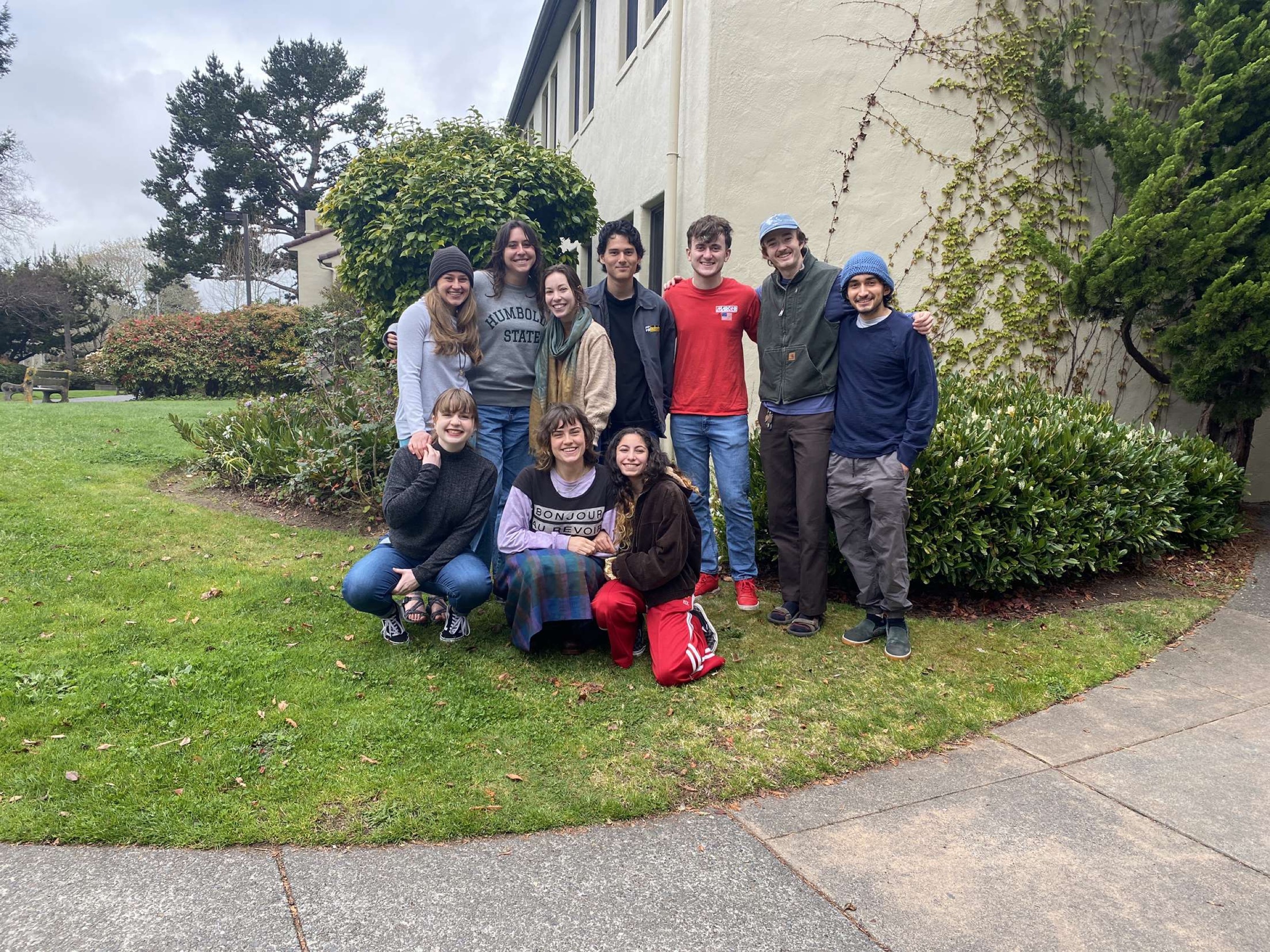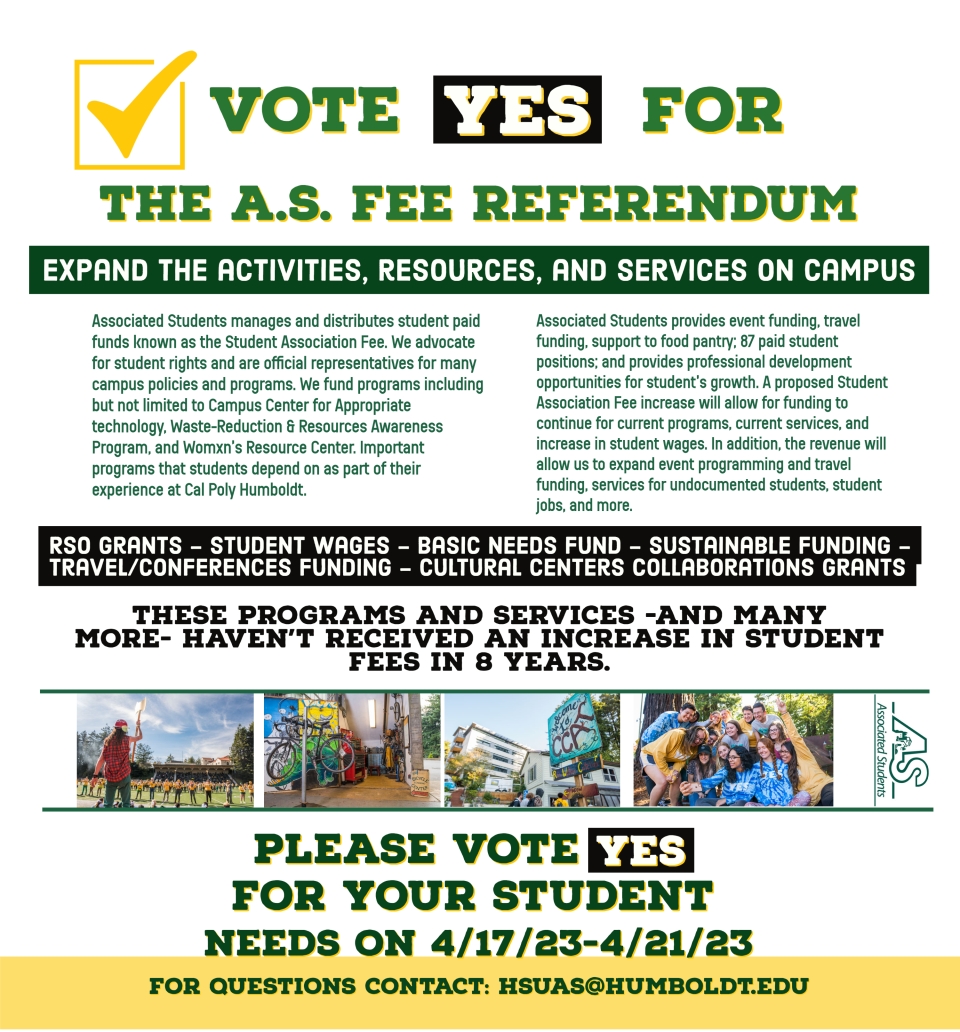History
What began as the Campus Recycling Program (CRP) in 1987 has now evolved into the Waste Reduction and Resource Awareness Program (WRRAP) here at Humboldt. The CRP began as a volunteer program run off-campus, but by 1989, funding was provided by Associated Students, and Warren House was made into the new office. CRP managed to purchase a 1956 Chevy truck through revenue gained from recycling cans. This allowed them to be more efficient at diverting Humboldt's waste from landfills accordingly. By the end of the year, CRP managed to divert over 8,000 pounds of material out of landfills. Facilities & Management have taken on the responsibility of maintaining proper recycling on campus, and WRRAP now focuses their goals in other environmentally responsible forms. Today, CRP has developed into a multi-faceted program now known as the Waste Reduction and Resource Awareness Program (WRRAP) that officially took its place on campus in Spring 2010. We continue to divert Humboldt’s waste from the landfill with the popular Reusable Office Supply Exchange (R.O.S.E.), Zero-Waste and Take Back the Tap events, maintaining a compost diversion program, and actively educating the campus community on waste reduction.
Mission
WRRAP aims to bridge awareness through outreach and education, encouraging students and faculty alike to participate in a lifestyle that reflects helping the earth, not hurting it. Through five branches, WRRAP can effectively reach out to the Humboldt community through interaction, hosting events, and providing environmentally sound resources where needed. The five branches currently include:
- The Compost branch offers a Compost demonstration site and educational workshops as well as diverting Humboldt's food waste from entering landfills. Although the majority of recycling operations are now part of Plant Operations, WRRAP still collects compost from core locations across campus. WRRAP recently acquired a Radburro electric cargo trike, funded by Humboldt Energy Independence Fund. This e-trike is currently being used to support compost operations. Previous transportation methods include a small electric golf cart (acquired with the cooperation of Facilities Management), a ’99 Ford 250 truck (purchased in part with Associated Student unallocated funds and in part with university funds), and the Ecocycle. The Ecocycle is a two-person, human-powered, kinetic recycling vehicle, originally built for the Kinetic Sculpture Race, which was purchased from its builder, Mark Mueller in 1992. It served as a great tool for the campus, gaining much publicity, hauling heavy loads of recycling, and using raw human power. In Spring 2006, the Ecocycle was finally put to rest as the racing gears could not keep up with the heavy hauls. We continue using human power with bike trailers and many helping hands.
- The Education branch compliments WRRAP's mission by educating the student body in numerous comprehensive ways. Our other departments have been actively working to bring awareness and understanding of resource conservation both on campus and in the community as well as a dynamic network of other organizations working towards common goals. By organizing composting workshops, zero waste events, Take Back the Tap events, tabling in the quad, performing educational outreach presentations, designing interpretative displays, and making personal contact with the campus community, WRRAP’s education works to show the connections between individual choices and the waste produced on campus.
- ROSE (Reusable Office and Supply Exchange) branch provides a space within Warren House 53 for donations and supplements of reusable school and office materials to encourage reusing and reducing what would otherwise be considered waste. ROSE provides a space for the donation of reusable materials on campus and tracks the amount of these materials that have been repurposed free of charge rather than sent to a landfill.
- Zero Waste and Take Back the Tap (TBTT) branch encourages campus organizations and the community in "Green Certified" events that generate minimal to zero waste and provides clean, filtered water for the entire Humboldt community. Take Back The Tap promotes the elimination of bottled water on campus by providing reusable water bottles and Hydration Stations offering a place to fill these bottles with clean, filtered, and great-tasting tap water, as well as offering students a Bottle-Free Commencement. The Zero-Waste Event department assists the campus community in putting on events that generate minimal to zero-waste, by providing educational guidance, compost buckets, and reusable dishware.
- The Bicycle Learning Center advocates for bicycling as a safe, affordable, healthful, sustainable, and fun form of transportation, and recreation. By providing tools, parts, and education for students to practice bicycle maintenance, we empower the community to ride and maintain bicycles with confidence, as well as to share their knowledge and skills with others. Founded as a club in 1992, the BLC closed for nearly a year before alumnus Rory Baker (’16, Environmental Management & Protection) led the charge to revive the center in 2015 by relocating it to a small workspace beneath the steps leading into the West Gymnasium. In 2018 alumnus Jay Ryan ('19 Environmental Science & Management) led the transition for the BLC to be a branch of WRRAP, an Associated Students program. The BLC continues to be open to students for free, and judgment-free, bicycle maintenance support, and education.
Why WRRAP?
The Waste Reduction and Resource Awareness Program (WRRAP) at Cal Poly Humboldt in Arcata, California strives to encourage alternative perspectives on consumption and provide a means for landfill substitution in our campus community. The five departments of WRRAP; the Bicycle Learning Center, Compost, Education, ROSE (Reusable Office Supply Exchange), and Zero-Waste Events; offer a diverse student outlet for hands-on learning experiences that helps students take responsibility for the campus’ waste flow and make a positive contribution to the quality of our campus environment. WRRAP endeavors to bridge awareness and action through all of its programs.
Through all these programs, WRRAP’s mission remains a focused commitment to the landscape of environmentally aware action that Cal Poly Humboldt is known for. Green Graduation and Donation Dash are two of our largest and most important events every year. Green Graduation focuses on making each year’s commencement and graduation ceremonies zero-waste. WRRAP’s Take Back the Tap and Zero-Waste departments take on responsibility for providing reusable water cups and tap water on-site, as well as compost bins and compostable food-wares. Donation Dash focuses on diverting waste during the move-out days at the campus dorms. Donation Dash is run by all members of WRRAP’s staff, as well as a large team of volunteers and campus staff and faculty who are kind enough to give their free time during Finals Week to help. Donation Dash involves diverting all recyclables from going to land-fills, as well as collecting unwanted belongings such as electronics, school supplies, clothing, furniture, and food from students who would otherwise be sending these items to the land-fill.
Because of this recognition, WRRAP receives requests for information and advice from other university recycling programs around the world. Due to the innovative nature of WRRAP, Humboldt was chosen by the California Integrated Waste Management Board in 1992 to be one of three model campus recycling programs for the CSU and UC systems, and of the three model programs, Humboldt was judged to be the most in-depth and extensive campus. Even more, the Integrated Waste Management Act (AB939), which mandated every city in California reduce its waste 50% by the year 2000, excluded state institutions. Humboldt set the same goal of 50% waste reduction at the urging of WRRAP and is proud to say we reached the goal of 50% waste reduction in 1996. Since then, new legislation (AB75) has extended the same diversion mandates to state agencies.
As an organization, we look with pride to the several commendations we have received from the recycling industry. WRRAP has received several Humboldt County Waste Reduction Awards, over the years for "Most Effective Composting Activity". WRRAP was also recognized with a California Resource Recovery Association Public Education Award and has received numerous Cooperative Community Foundation grants for excellent community contribution. WRRAP has been reported in nation-wide industry journals including Bio-Cycle, EPA News, and Resource Recycling and recognized by then State Senator Mike Thompson, Assemblywoman Virginia Strom-Martin, the Humboldt County Board of Supervisors, and the City of Arcata. Because of this recognition, we receive requests for information and advice from other university recycling programs around the world. Due to the innovative nature of WRRAP's program, we expect this success to continue.

